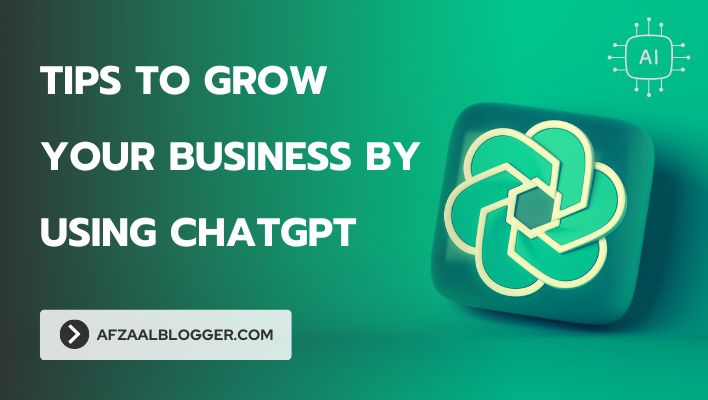Tips to Grow Your Business By Using Chatgpt
Welcome to the future of business growth! In today’s digital age, staying ahead of the competition is more critical than ever. And that’s where ChatGPT comes in. This revolutionary AI-powered tool has taken the business world by storm, offering companies a game-changing way to connect with customers, generate leads, and skyrocket their success.
Whether you’re a small startup or an established enterprise, harnessing ChatGPT can provide you with a competitive edge like never before. So buckle up and get ready to discover some incredible tips on how to grow your business using this cutting-edge technology!
What is Chatgpt?
ChatGPT is an advanced language model developed by OpenAI. It stands for Chat Generative Pre-trained Transformer. But what does that mean exactly? Essentially, it’s a state-of-the-art artificial intelligence system trained to understand and generate human-like text responses.
Powered by deep learning algorithms, ChatGPT has been fine-tuned on a vast amount of data from the internet. This extensive training enables it to comprehend context, provide relevant answers, and engage in meaningful conversations with users.
With its natural language processing capabilities, ChatGPT can be integrated into various platforms such as websites or messaging apps to interact with customers in real-time. It acts as a virtual assistant or chatbot that understands queries and responds accordingly.
The beauty of ChatGPT lies in its ability to adapt and learn over time. As more interactions take place, the AI model refines itself through continuous feedback loops, constantly improving its understanding and generating even better responses.
ChatGPT is an innovative tool that leverages AI technology to simulate human-like conversation. Its flexibility, scalability, and learning capabilities make it a powerful asset for businesses looking to enhance customer engagement and streamline operations through automated communication channels.
How can Chatgpt help businesses?
ChatGPT, powered by OpenAI, is an advanced language model that has the potential to revolutionize how businesses interact with their customers. With its ability to generate human-like responses and engage in meaningful conversations, ChatGPT opens up a world of possibilities for companies looking to enhance customer experience and drive growth.
One way ChatGPT can benefit businesses is by serving as a virtual assistant. By integrating ChatGPT into their websites or chat platforms, companies can provide instant support to customers around the clock. Whether it’s answering frequently asked questions or resolving simple queries, ChatGPT can handle these tasks efficiently and free up human resources for more complex issues.
Furthermore, ChatGPT can personalize interactions with customers. It can analyze customer data and preferences to deliver tailored recommendations or suggestions. This personalized approach not only enhances customer satisfaction but also increases the likelihood of conversions.
Another valuable application of ChatGPT is in sales lead generation. By engaging potential customers in conversational interactions through chatbots powered by ChatGPT, businesses can gather important information about their needs and preferences. This data can then be used to identify qualified leads and target them with customized marketing campaigns.
Additionally, content marketing efforts can be significantly amplified using ChatGPT. Businesses can leverage this technology to create compelling blog posts, social media updates, or email newsletters that resonate with their target audience. The natural language generation capabilities of ChatGPT ensure that content is not only informative but also engaging.
Can ChatGPT find sales leads?
Can ChatGPT find sales leads? The answer is yes! ChatGPT, with its advanced language processing capabilities, can be a valuable tool for businesses to identify potential sales leads. By leveraging the power of natural language understanding, this AI model can analyze customer interactions and extract relevant information that can help businesses identify potential prospects.
One way ChatGPT can assist in finding sales leads is through chatbots. These intelligent virtual assistants are programmed to engage with customers in real-time conversations, providing personalized recommendations and answering queries. As customers interact with the chatbot, their responses can be analyzed by ChatGPT to identify patterns or keywords that indicate a potential interest in products or services offered by the business.
Another method is using ChatGPT for social media monitoring. By tracking mentions of specific keywords related to your business on platforms like Twitter or Facebook, you can uncover potential leads who are discussing topics relevant to your offerings. Through sentiment analysis and keyword extraction, ChatGPT enables businesses to proactively reach out to these individuals and convert them into customers.
Furthermore, by utilizing the natural language generation capabilities of ChatGPT, businesses can create targeted content such as blog posts or whitepapers that cater directly to the needs and pain points of their target audience. This valuable content not only positions the business as an industry expert but also attracts potential leads who are searching online for solutions.
While it’s important to note that ChatGPT alone cannot guarantee an unlimited supply of sales leads; when utilized effectively within a comprehensive lead generation strategy, it has the potential to significantly enhance a business’s ability to find new prospects and grow revenue streams.
What are some tips to use Chatgpt effectively?
1. Understand your business goals: Before diving into using ChatGPT, it’s crucial to have a clear understanding of your business goals and how you want the AI model to assist you. Whether it’s improving customer support, generating leads, or enhancing content creation, aligning with your objectives will help you make the most out of this powerful tool.
2. Train the model effectively: To get accurate and relevant responses from ChatGPT, invest time in training the model properly. Provide specific instructions and examples that reflect your desired outcomes. Experiment with different prompts and evaluate results to refine their performance over time.
3. Collaborate with human agents: While ChatGPT can handle many tasks independently, collaborating with human agents is essential for complex queries or sensitive issues that require human empathy or judgment. Combining AI capabilities with human expertise ensures a more comprehensive and reliable customer experience.
4. Continuously iterate and improve: AI models like ChatGPT are not static; they can be fine-tuned based on user feedback and ongoing improvements in training data. Regularly review interactions, identify areas for improvement, update guidelines accordingly, and retrain the model as needed to enhance its performance continually.
5. Utilize fallback mechanisms: Despite advancements in language models like GPT-3 used by ChatGPT ensuring coherent answers most of the time, there may still be instances where it produces incorrect or nonsensical responses.
Implement fallback mechanisms such as providing predefined responses when uncertain or having a “flag” feature for human review.
Incorporating these tips will help businesses leverage chatbots powered by ChatGPT more effectively delivering better customer experiences while achieving their growth objectives through enhanced efficiency and productivity.
How to use ChatGPT for content marketing?
ChatGPT can be a game-changer when it comes to content marketing. Its natural language processing capabilities allow businesses to create engaging and personalized content that resonates with their target audience.
Start by understanding your target audience and their pain points. Use ChatGPT to generate ideas for blog posts, articles, or social media captions that address these pain points directly. This will help you establish yourself as an authority in your industry while providing valuable solutions.
Next, leverage the power of conversational AI to engage with your audience. Create chatbots using ChatGPT that can interact with website visitors or social media users in real-time. These chatbots can answer frequently asked questions, provide product recommendations, and even assist in completing purchases.
Furthermore, use ChatGPT to optimize your SEO strategy. Generate keyword-rich meta descriptions and title tags for your web pages or blog posts using this powerful tool. By incorporating relevant keywords suggested by ChatGPT into your content, you can improve its search engine visibility and drive more organic traffic.
Don’t forget the importance of analytics. Monitor user interactions with the generated content through tools like Google Analytics or chatbot analytics platforms. This data will provide insights into what works well and what needs improvement to refine your content marketing strategy further.
Incorporating ChatGPT into your content marketing efforts opens up a world of possibilities for business growth. With its ability to generate creative ideas, enhance customer engagement through chatbots, optimize SEO strategies, and analyze performance metrics – no doubt leveraging this technology can take your business to new heights!
Case study: how one business used Chatgpt to grow its business
In today’s competitive business landscape, staying ahead of the curve is crucial. That’s why more and more businesses are turning to innovative solutions like ChatGPT to help them scale and thrive. One such success story involves a small e-commerce company looking to expand its customer base.
By leveraging the power of ChatGPT, this business was able to enhance its customer service experience significantly. With the ability to handle multiple inquiries simultaneously, ChatGPT boosted its response time and improved overall customer satisfaction.
Furthermore, this company utilized ChatGPT as a virtual sales assistant. By training the model on their product catalog and offering personalized recommendations based on user preferences, they were able to convert leads into actual sales at an impressive rate.
Another way this business harnessed the potential of ChatGPT was through content creation. They used it as an AI-powered writing tool that generated engaging blog posts and social media captions effortlessly. This not only saved valuable time for their marketing team but also helped improve organic reach by crafting compelling content that resonated with their target audience.
Additionally, the company implemented proactive outreach strategies using ChatGPT’s capabilities. By utilizing chatbots powered by GPT models, they could initiate conversations with users who had shown interest in similar products or demonstrated buying intent elsewhere online. This approach allowed them to capture leads effectively and drive conversions.
The results were remarkable – within just a few months of implementing ChatGPT into their operations, this business observed a significant boost in website traffic, higher conversion rates, and increased revenue streams from new customers acquired through proactive outreach efforts.
Conclusion
This case study demonstrates how one forward-thinking business leveraged the power of ChatGPT across various aspects of its operation – from enhancing customer service experiences and driving sales growth through personalized recommendations to creating compelling content for better brand engagement.
By embracing emerging technologies like AI-powered chatbots powered by ChatGPT, businesses can unlock new opportunities for growth and thrive today.
Read also: Youth Business Summit 2023








Write a Comment